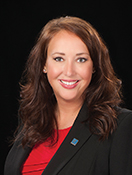 NAR’s 2018 President Prioritizes REALTOR® Professionalism and Putting the American Dream Back Within Reach
NAR’s 2018 President Prioritizes REALTOR® Professionalism and Putting the American Dream Back Within Reach
With her engaging, approachable leadership style, Elizabeth Mendenhall will be advancing several critical goals during her tenure as 2018 president of the National Association of REALTORS® (NAR). CEO of RE/MAX Boone Realty in Columbia, Mo., Mendenhall is a sixth-generation REALTOR® with 20 years in the business. Her list of accomplishments and honors is rivaled only by her many industry roles in associations and committees over the course of her career. “This career provides more flexibility than most 9-5 jobs. It offers us the freedom to give back and get so much more out of it,” she explains. In this exclusive interview, hear what tops NAR’s priority list for the year ahead, and how Mendenhall believes the industry must evolve.
Maria Patterson: As a sixth-generation REALTOR®, it’s easy to see how you landed in the real estate business!
Elizabeth Mendenhall: My family had always been in real estate, so of course, I was curious about the business. My grandmother had a stroke in 1996 and that was the year I started with the company. Something my mom said at the time made a lot of sense. She said, “You’re young enough that if you like it, you’ll get a head start on everyone; and if you don’t like it, you’re young enough to go and do anything else.” With my family being in the business, it was easy to get into…but not as easy to leave!
MP: What are your thoughts upon assuming the role of NAR president for 2018?
EM: I’m very excited, and I think our membership is excited, and it coincides with the fact that we have a new CEO. I’m excited to be partnering with Bob Goldberg to develop the future of where we’re heading.
MP: You’ve had great success as a broker. What are some of the key factors in that success?
EM: Having a family business allowed me to understand as a broker that agents are a critical part of the team. Our agents are our customers—their success equals our success. We need to always keep that in perspective. Because of that, our agents know that we would do anything we can to help them improve their business.
MP: You’ve also been very committed to serving the real estate industry through various association and board roles. Why do you believe it’s important to have that level of involvement?
EM: There probably isn’t any other resource where I get more industry information and education than NAR. Being involved in the association means you get the information earlier, understand it better, and know how to relate it to improving sales. As managers, it’s our responsibility to give back to this industry. This career provides more flexibility than most 9-5 jobs. It offers us the freedom to give back and get so much more out of it. Almost all of our agents are involved on boards—it’s a culture. And I think it contributes to the fact that we have the highest marketshare in our area. They know that they do better when they’re more involved in staying current in the industry; it’s easy for us to equate that to business success.
MP: In your opinion, what have been some of the most significant changes to the real estate business over the course of your career?
EM: Certainly, the link between contract to close has sped up since I started. Some of the changes in lending through technology are getting people into homes even quicker. Some of the other significant changes include increases in regulations, especially more regulations for us on the brokerage/management side. I don’t know if that always translates to something the consumer sees, but it’s changed the business model, and that’s put more of a pinch on brokers.
The other important change is that other parties have taken over key pieces of the transaction. Portals are not just an advertising venue anymore, but are now connecting with the consumer. Portals used to be more of a vendor involved in facilitating the transaction, but now they’re involved in facilitating the relationship with the consumer. I think that’s a significant change, and it begs the question: When someone is advising and interacting and providing so much content and information about the real estate transaction, at what point do they have a responsibility to have a professional license?
MP: What are some of the biggest challenges REALTORS® are currently facing?
EM: The biggest market challenge right now is lack of inventory and increasing development costs. The other challenge we’re facing is that consumers aren’t moving as rapidly. They used to move every 5-7 years, and now they’re moving every nine years. That means we have to double the business transactions to maintain our business.
MP: And what do you consider to be some of the best opportunities out there?
EM: Because there is so much more information out there, the consumer is looking for someone to help them sort through it all. There’s a huge opportunity to be an expert in affordable and first-time housing to 80 million millennials, and be a transitional agent for baby boomers looking to downsize. For top agents, there’s an opportunity for them to form a team. It’s a viable business option for today and the future. We’re in the type of environment where there’s a lot more opportunity for business if we harness the power of collaboration.
MP: In your opinion, what is the current state of the overall national real estate market? What are your predictions for housing in 2018?
EM: Housing inventory is way below average levels. That, combined with the lack of new construction, is creating a massive supply crisis in metro areas. In 2018, I think we’re going to continue to see the pricing out of households—affordability is a problem. But the good news is, people are still moving, and demand is remaining high.
I’m also terrified about what these storms and other natural disasters are going to do. Hurricanes Harvey, Irma, Maria, the wildfires (at press time)—this is a massive crisis that’s going to drive up construction costs and the price of materials. We saw that back with Katrina. We have to be aware of this and help ensure people aren’t taken advantage of.
MP: In your opinion, what are the biggest legislative/regulatory concerns for real estate?
EM: Flood insurance was just extended. Now we need to bring back national disaster insurance. We’ll be looking at tax reform again and we’ll be focused on prohibitive mortgage fees. We already have an appraiser shortage, and with the storms, there’ll be a lot of conversation around that.
MP: What will be the most pressing priorities during your term in office, and why?
EM: Professionalism is at the top of everyone’s minds, but it looks different than it did 20 years ago when we didn’t have as many teams, and we didn’t have portals, and we didn’t have as much technology. All of that changes the one-on-one relationship and what someone considers professional. Advocacy issues like homeownership, affordability and tax reform will be high on the agenda, and we’re also the main voice for property ownership, making sure America is the place where you can own property—we’ve been seeing housing numbers decline, and we need to change that.
We also need to look at managing data and managing it professionally for our members and consumers. We have to get better with the management of our MLS system and sharing data with others. We also have to ensure that REALTORS® are essential to the consumer. Our old vocabulary is that the REALTOR® has to “be at the center of the transaction,” but that’s not the case anymore. We have to ensure that the “REALTOR® is essential to the consumer in the transaction.”
MP: What are the biggest concerns of real estate consumers right now, and how can REALTORS® best address these concerns?
EM: Consumers want to make sure they’re going to get a good return on their money for the house they invested in. We want to make sure our membership has the professional skill set to help consumers make informed decisions. We also know that consumers are more concerned about buying houses that are energy-efficient. They’re understanding more of the real cost of owning a home, not just what they pay the bank.
Consumers are also very concerned about affordability. Some of that is real, and some of that is fear. For REALTORS®, it’s a good opportunity to show consumers that in many markets, it’s cheaper to own a home than rent.
For more information, please visit www.nar.realtor.
Maria Patterson is RISMedia’s executive editor. Email her your real estate news ideas at maria@rismedia.com.
For the latest real estate news and trends, bookmark RISMedia.com.












